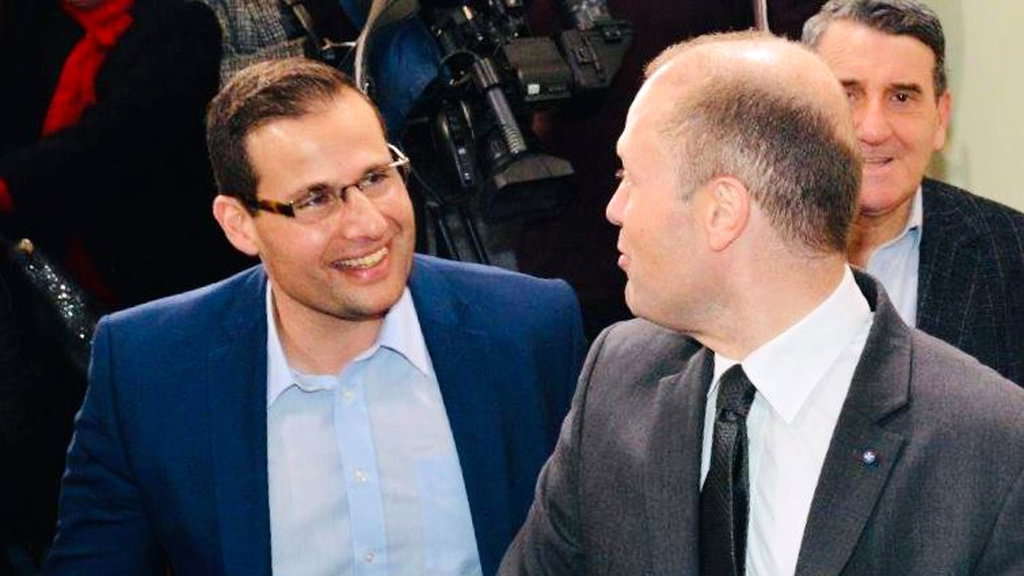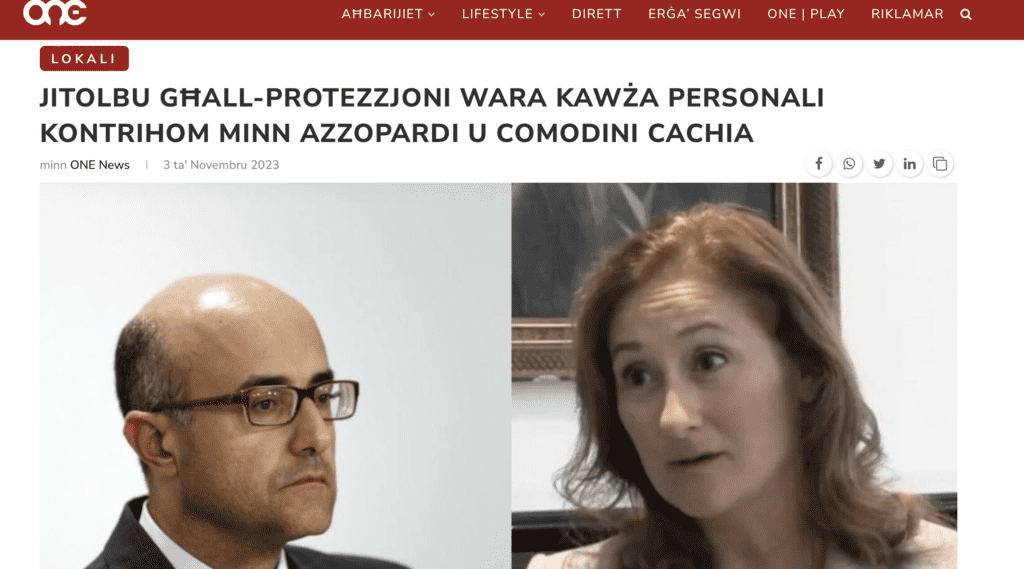
This post will refer to several episodes that happened over the last few days that may at first appear unconnected but are in reality part of a growing trend of erosion of every individual’s right to seek the protection of the court from their government.
Consider first this One TV report of a lawsuit brought by a trade union after its claim to represent a group of professionals was rejected by a tribunal the union believes is not impartial.
Some background. Many aspects of Maltese administrative law are decided by administrative tribunals presided over by part-time government appointees, not by proper courts run by judges. Naturally an administrative tribunal frequently rules on disputes between individuals or private organisations on the one hand and the government on the other. But since it’s the government that hires and fires people to sit on tribunals there’s often concern their decisions might not be altogether free of the government’s influence.
When a lawsuit one brings against the government is going to be decided by a judge who cannot be punished by the government for ruling against it one can hope they’ll get a chance at having their case heard with fairness. When the person deciding is a part-timer who owes their position to the grace and favour of the minister one is suing, one is less optimistic.
We’ve had part-time administrative tribunals for ever. Labour did not invent them. But the 2018 Venice Commission study that looked into why Malta’s democracy allowed Daphne Caruana Galizia to be killed listed this system as one of the opportunities a government has to capture institutions that are supposed to keep it in check. The Venice Commission said we should change the system. The government ignored them as they ignored most recommendations the Venice Commission made that were not the subject of a case brought to the European Court of Justice by Repubblika.
The union who lost an argument at the industrial tribunal decided to go to the constitutional court to test the question as to whether you can get a fair hearing by a part-time board set up by ministers. They filed a complaint that they cannot get a fair hearing by members of a tribunal employed by the government they are suing. Getting a fair hearing is a fundamental human right protected by the constitution and recourse to a court to enforce that right is a right in itself.
You’d expect the government to prepare a defence that the union’s right to a fair hearing is indeed not in danger and then all sides wait for the courts to decide. But a government that is contemptuous of the courts – and a little afraid of them – doesn’t stop there.
Go back to the One TV report.

The prominent characters in the coverage are not the union who are seeking to have their rights protected but the lawyers they hired, Jason Azzopardi and Therese Comodini Cachia who are described as “li jkunu anki ma’ Repubblika jitkellmu fuq is-saltna tad-dritt” that loosely translates as “are often seen with Repubblika talking about the rule of law”.
The slimy implication is that it is hypocritical of people who believe in the rule of law to contest a tribunal’s decision in another court. Once a court decides, they seem to say, resorting to some form of appeal or complaint of any form in another court, proves contempt for the law.
This is nothing short of bullying. It punishes the union for hiring two lawyers the government does not like and it propagates the false notion that asking a court to review the decision of another court is somehow unlawful.
Not that I need to remind you, but One TV is the ruling party’s TV station which makes its “reporting” an action of the government. Just in case there was any ambiguity Andy Ellul, the government minister with the informal responsibility of dressing partisan propaganda in a suit and a tie, delivered a government press conference continuing in this line. Consider that Andy Ellul referred the case to the tribunal in the first place. Now that the board members of the tribunals have been included in the lawsuit Andy Ellul announced he is paying for their legal defence. It’s not like he needed to confirm that the board members are an extension of his will. And yet there he was doing it.
The pretext of the argument is that the members of the board tribunal were named as respondents in the union’s lawsuit. Clutching their pearls, the board members, salaried government appointees to the man, asked for the government’s “protection”. Protection from what?
A human rights case is only ever brought against the government. The three board members are included because of a procedural rule that says that a lawsuit can only be enforced if it includes all interested parties. The board members are being accused of not being impartial and a case deciding on them must surely be one which gives them the opportunity to deny that, if that’s what they want to do. Since they’re the board members being cited for being unable to be impartial they are included in the suit just in case they have any interest in the outcome of the case and their absence from the suit might be used by the government as an excuse to have the case dismissed on a technicality.
From their point of view the worst possible outcome of the lawsuit would be to have their ruling nullified by the constitutional court. It’s not like they’re looking at prison or even a fine. Their hysterical reaction to being named in the suit is wild theatrics, an act of false indignation to mobilise the anger of the One TV watching crowds.
The government knows this. There is no doubt the government would have objected to the board members’ exclusion had they been left out of the union’s lawsuit and they would have asked for the case’s dismissal for that reason alone.
The government accuses others – in this case Jason Azzopardi and Therese Comodini Cachia – of hypocrisy when the government is clearly and plainly guilty of it.
This compares a bit with Raphael Vassallo screaming blue murder on his newspaper because I asked the Court of Appeal to review a lower court’s decision about a human rights complaint over a court ruling on a libel suit he brought against me. My lawsuit is against the state but he is included as a respondent for exactly the same reason as the board members are included in the union’s case. It’s procedural, inevitable, and has nothing to do with whatever personal feelings someone bringing a lawsuit might have about the matter.
The chilling warning in Raphael Vassallo’s diatribe is a reference, with some horror, that I have the right to ask the European Court of Human Rights to review my complaint. The monstrous notion has amused Simon Mercieca as well. These gentlemen present the right of asking the European Court of Human Rights to review a complaint as some wilful act of barbaric hypocrisy, inconsistent with the conviction in the rule of law.
In a rules-based system the courts exist to review, examine, and when necessary rectify administrative error or unlawful action by the authorities. The right of individuals to seek redress and protection from unlawful actions by the state is a democratic beauty which is but a few decades old.
Now Raphael Vassallo and Simon Mercieca would be horrified at the accusation that their hostility to due judicial process and particularly the function of the constitutional court as the guardian of fundamental human rights is one and indivisible with the government’s conduct. Raphael Vassallo will be familiar with the notion, which he rejects, that whether he knows it or not his muddled thinking and his woolly writing serves the interests of the government.
It’s the same government which is also starving judges of even the most basic resources they need to do their job. Judges are not bloggers. They are not inclined to hyperbole. When they openly say that the judicial system has been so deprived of the government’s attention that it is “near collapse”, you have to place their choice of words firmly in the realm of understatement.
It’s also the government which is suggesting judges are “bought by the Nationalists” in polite conversation now. According to Bernard Grech, the remark was made by Minister Anton Refalo in reference to Judge Francesco Depasquale whose findings in the VGH / Steward scandal were partly overturned by a higher court because he did not take into account the government’s collusion with the fraud perpetrated by the people who bought the hospitals.
The government wants you to think that the hospitals contract was not nullified by the courts because it was grounded in corruption and bribery but because it looks bad on Labour to have it cancelled and that must mean the Nationalists have arranged for that to happen. A judge who rules against the government must be in the pockets of the opposition (or of Repubblika which in their febrile hatred they see as indistinguishable from the opposition).
If you accept that, the government will always be right whatever the courts say. In the same way that they retain part-time tribunals made up of their cronies to ensure outcomes which are favourable to themselves, the government conditions the public to mistrust the courts to the point that anything they decide against the government is only perceived as proof of the courts’ anti-government bias rather than the government’s wrongdoing.
It’s also the government which is standing idly by as Joseph Muscat discredits the magistrate who looked for criminal responsibility into the collusion in the hospitals case, lying about her procedural obligations, and seeking to discredit her for not protecting his impunity.
They are bullying people by pushing the notion that the right to sue the government in the courts is somehow unlawful. They are mobilising the populist notion that asking the courts for protection is treasonous and partisan and wrong. They are doing that while starving the courts of resources and discrediting their reputation. All in the interest of finishing the job of capturing the last institution that might keep them in check.